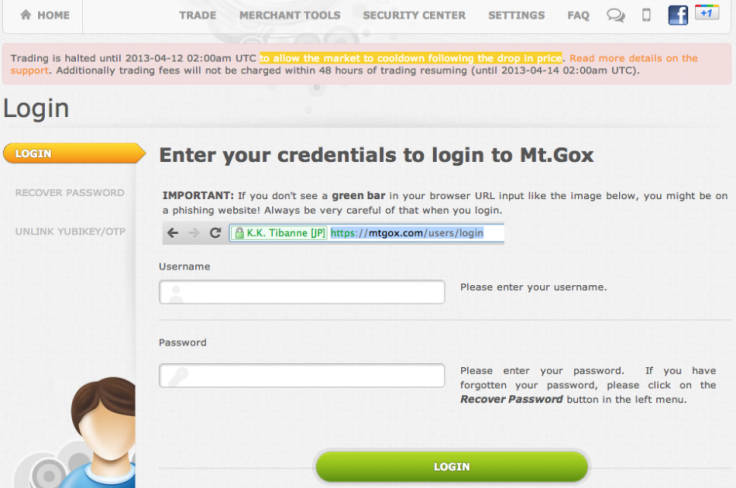Main Bitcoin Exchange Mt. Gox Halts Trading As Price Tumbles
Trading of Bitcoins on the Mt. Gox exchange has been halted for ten hours "to allow the market to cool" following another turbulent day's trading for the digital online currency.

Mt. Gox is responsible for 80 percent of Bitcoin trades in the US and 70 percent of all trades worldwide, so its decision to halt trading will drastically cut the amount of Bitcoins being bought and sold. Trading will start again at 2am UTC (3am GMT)on 12 April.
Speaking on its Twitter account, Mt. Gox said: "Trading is suspended until 2013-04-12 02:00am UTC for market cooldown. Once back trading will be also faster...We are upgrading our database."
The currency has seen wild fluctuations in price over the last week, climbing to $266 (£172) per coin on 10 April - up from $100 earlier this year - before crashing to $105 just hours later as traders panicked and sold when the exchange's servers were unable to cope with demand and slowed to a crawl.
Must Read: What is Bitcoin and how does it work?
At the time of trading being suspended on 11 April the price of Bitcoin was at $120, having fallen from around $165 earlier in the day.
Just last week, a distributed denial of service (DDoS) attack on Mt. Gox caused its trading systems to run slow. Those behind the DDoS attack would wait for the price to rise, sell their coins, execute an attack which would make the servers unstable and prompt traders to sell, thus lowering the value of Bitcoins, before buying again at the lower rate once the servers and price have stabilised.
Later in April, a computer virus was found spreading via Skype, hijacking computers and forcing them to mine for Bitcoins without the user realising.
Antivirus firm Kaspersky Labs said attackers sent messages to Skype users saying, in various languages, "this my favourite picture of you". The messages included a link that was being clicked more than 2,000 times per hour at its peak and doing so would start the covert mining, returning coins to the hackers
Mt. Gox said the slowing of its servers on 10 April was not a DDoS attack as first suggested by another exchange, but was due to a vast increase in Bitcoin traders using the service. The Exchange said it has seen 75,000 new accounts created in the first ten days of April, compared to the 65,000 created in the whole of March.
A statement from Mt. Gox earlier in the day said it is "working around the clock" to improve stability.
© Copyright IBTimes 2024. All rights reserved.






